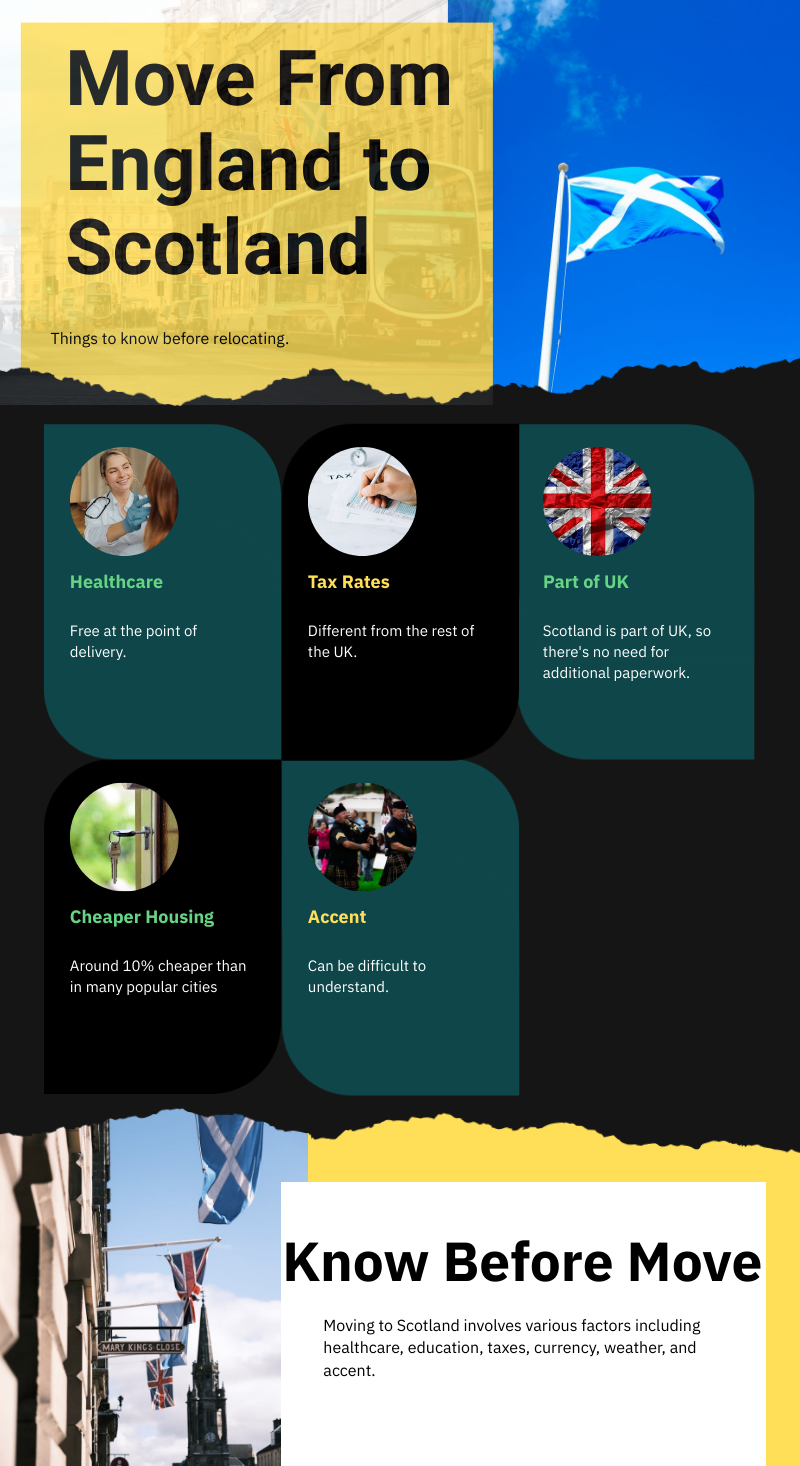While moving from England to Scotland might not seem like a big change since both are a part of the same country, it needs to be said that there are some differences to be aware of.
Most people who move from the rest of the UK, and especially from England, to Scotland, do that for the sake of employment, but it must be said that this is not the only reason for migration.
But before someone makes this move, being aware of several factors is an absolute must. That is why we want to provide you with the most important ones.

The Essentials

UK citizens relocating from England to Scotland don’t need to worry about extra paperwork like visas or work permits. This shared nationality facilitates an easier transition in many ways, from accessing healthcare to setting up a new home.
Not to mention that they share more than 200 institutions, according to a report[1] conducted by the government. The best-known ones are:
- BBC
- The National Lottery
- Research Councils UK
- DVLA
- HM Passport Office
Generally speaking, this is a smooth transition.
Employment Opportunities
As statista shows[2], Scotland’s unemployment rate was at 4% at the end of 2023, which is a slight increase from the beginning of the same year.
A report from November 2023[3] indicates several things:
- The inflation fell from 6.7% to 4.6% (not just in Scotland, but in the whole country as well.)
- Job postings decreased by 4%.
Furthermore, the employment rate, before the update in early 2024, was:
- The employment rate – 74.3%
- Economic inactivity rate – 22.7%
- Unemployment – 3.9%
The highest demand was for occupations such as:
- Sales Related Occupations
- Care Workers & Home Carers
- Cleaners & Domestics
- Programmers & Software Development Professionals
- Sales and Retail Assistants
Transportation

Transportation options from England to Scotland are plentiful, with flying, trains, and buses all offering convenient routes.
The choice of transport can depend on your starting point, budget, and preference for speed versus scenic value.
Once you’re in Scotland, the country boasts efficient public transport options, significantly reducing the need for a car, especially in the major cities.
Choosing Your Mode of Transportation
The selection of transportation heavily depends on where you’re starting from, your budget, and whether you prioritize speed or the opportunity to witness the stunning landscapes.
However, once you arrive in Scotland, you’ll find the country’s public transport system encompassing an extensive network of trains, buses, and ferries remarkably efficient, reducing the necessity for a personal vehicle, particularly in urban areas.
Public Transport System
Scotland’s public transport system is comprehensive, connecting major cities, towns, and even remote areas through trains, buses, and ferries.
- Trains: The train network is extensive, covering major urban centers and towns, though some parts of the Highlands and Southern Uplands might be inaccessible, requiring travelers to switch to road transport.
- Buses: Buses reach most corners of Scotland but may operate infrequently in isolated rural areas and on some islands.
- Ferries: Operated primarily by companies like Caledonian MacBrayne (CalMac), ferries are essential for connecting the mainland to the Scottish islands and crossing lochs, though winter schedules are more limited.
Healthcare in Scotland

One of the most significant benefits of moving within the UK is the continued access to the National Health Service (NHS). Healthcare in Scotland is managed by NHS Scotland and remains free at the point of use for all residents, ensuring peace of mind for you and your family.
An employed, or self-employed, individual is entitled to free healthcare.[4] But that’s not all, the spouse and immediate family also enjoy this privilege.
According to a Newsweek report[5], three hospitals from Scotland found their place among the best ones in the UK:
- Glasgow Royal Infirmary
- Royal Infirmary of Edinburgh at Little France
- Queen Elizabeth University Hospital
Housing in Scotland (The Market and Costs)

Housing costs in Scotland can vary widely, with competitive markets in city centers.
Nevertheless, living costs in Scotland, including housing, are generally around 10% cheaper than in many popular cities, and even 39% lower than costs in London[4.1].
It’s essential to research the housing market in your chosen area thoroughly. Also, familiarize yourself with the concept of home reports, which are required for every property sale in Scotland, and provide buyers with vital information.
The housing market had a surge during COVID-19 and it continued until 2023. According to an estate agency DJ Alexander[7], the average cost to purchase property rose by 29%, from £150,625 to £194,006.
The highest changes were:
- East Lothian – £101,816
- East Renfrewshire – £79,734
- Edinburgh – £70,612
The lowest three price changes were in:
- Aberdeenshire – £26,062
- North Ayrshire – £24,447
- Aberdeen city with a decline of £778
The Legal System

Scotland’s legal system is distinct from that of England and Wales, with its own laws and courts. This includes differences in property law, criminal law, and civil law.
This system has developed independently from the English common law framework, though it has not remained impervious to its influence over the centuries.
It was shaped by the Treaty of Union signed in 1707[8], which unified Scotland and England under the United Kingdom, yet allowed Scotland to retain its distinct legal system.
Further autonomy was granted with the Scotland Act of 1998[9], which established the Scottish Parliament, endowing it with the authority to legislate on a wide array of devolved matters.
These include, but are not limited to, areas such as civil and criminal justice, education, the environment, and transport, while matters of foreign affairs and defense remain under the jurisdiction of the UK Parliament.
The Scottish Tax System
Scotland has its own tax system, which can be slightly different from the rest of the UK. Progressive taxation is functioning within the system. Here is an example of how it works[10]:

The Education System

For families moving with children, understanding Scotland’s education system is crucial. Scotland has its own education system, separate from the rest of the UK, with a focus on a broad and flexible curriculum.
Schools in Scotland aim to provide a comprehensive education that prepares children for life beyond the classroom. Additionally, the Scottish Qualifications Authority oversees qualifications, which might differ from those in England.
The Structure of Scottish Education
Scotland’s education system is structured to offer a wide-ranging and inclusive approach to learning. From the early years through to secondary education, the system is tailored to foster an environment where every child can thrive, emphasizing personal development as much as academic achievement.
Early Years and Primary Education
Early education in Scotland begins with nursery or pre-school education, available from the age of three, providing a solid foundation for learning in a playful and nurturing setting.
Primary education then commences at around the age of five, stretching over seven years (P1-P7), where the focus is on developing literacy, numeracy, and a broad understanding of the world.
Secondary Education and Qualifications
Secondary education takes students through six years of study, from S1 to S6. The curriculum is designed to be flexible, allowing students to explore a wide array of subjects before specializing in their final years.
The Scottish Qualifications Authority (SQA) oversees the national qualifications, offering different paths that cater to various academic and vocational interests. Notably, the qualifications in Scotland, such as National 4 and 5s, Highers, and Advanced Highers, are unique to the Scottish system, differing from the GCSEs and A-Levels found in England.
Curriculum for Excellence
At the heart of Scotland’s education system is the Curriculum for Excellence (CfE), which aims to provide a coherent, more flexible, and enriched curriculum from 3 to 18 years old. The CfE is designed to equip children and young people with the knowledge, skills, and attributes needed for life in the 21st century.
It encourages an interdisciplinary approach to learning, critical thinking, and the application of knowledge in real-life situations.
Education and Tuition Fees

For those moving with family or considering further education, it’s worth noting that university tuition fees in Scotland are significantly cheaper, with no tuition fees for Scottish residents studying in Scotland. This could influence your decision if education is a priority. Also, countries like Australia are also offering similar benefits.
Tuition Fee Structure for Scottish Residents
The Scottish Government plays a pivotal role in financing education, typically covering the full tuition fees for undergraduate students who are Scottish residents for the duration of their studies. This commitment ensures that higher education remains accessible and affordable.
For eligibility, students must confirm their residency status with the Student Awards Agency for Scotland (SAAS), which manages the payment of tuition fees for those who qualify.
For the 2024 entry, the standard tuition fee for full-time undergraduate degree programs is set at £1,820[11], with exceptions for certain professional degrees.
This fee arrangement is administered by SAAS, highlighting Scotland’s investment in fostering a well-educated populace.
Part-time students earning up to £25,000 annually may qualify for a Part-time Fee Grant, further exemplifying Scotland’s commitment to flexible learning paths.
Means-tested loans and bursaries, such as the Young Student’s Bursary and the Independent Student’s Bursary, are available to assist with living costs, ensuring students from all backgrounds have the opportunity to pursue higher education.
References:
1. What staying in the United Kingdom means for Scotland report, 2014
2. Statista – Unemployment rate in Scotland from 2nd quarter 1992 to 4th quarter 2023
3. Skills Development Scotland – Economy, People, Skills, November 2023
4. Scotland.org – Healthcare in Scotland
- 4.1 – Money and currency
5. Newsweek report – World’s Best Hospitals 2023
6. Gov.Scot – Help with health costs: quick guide – July 2022
7. DJ Alexander – Housting Cost report 2023
8. Parliament.uk – Act of Union 1707 paper
9. Legislation.gov.uk – Scotland Act 1998 paper
10. Litrg.org.uk – Scottish income tax
11. Gla.ac.uk – Tuition Fees: Scottish Students
Noah MacQuoid is an expert in international relocation, with a strong background in visa and moving services. Previously working for a specialized relocation agency, he now contributes to the centrefortowns.org website, sharing his knowledge on moving countries, navigating visa processes, and settling into new cultures.





